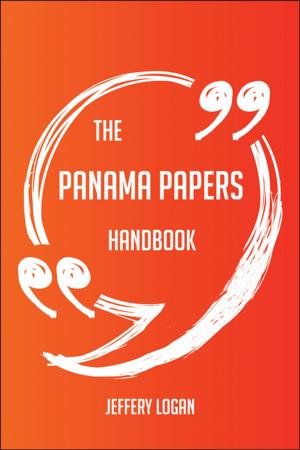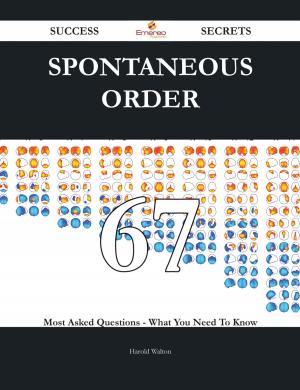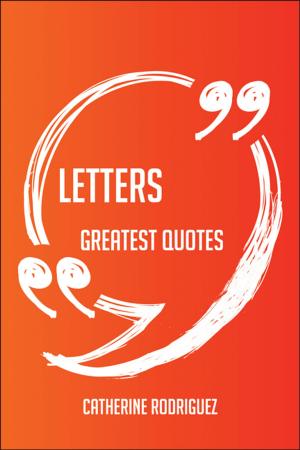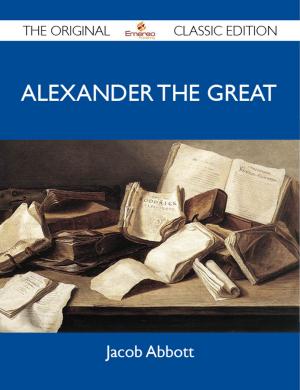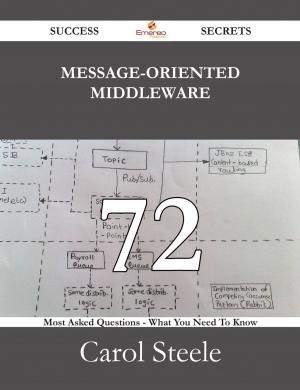Anima Poetæ - The Original Classic Edition
Nonfiction, Reference & Language, Reference, Fiction & Literature| Author: | Samuel Taylor Coleridge | ISBN: | 9781486494774 |
| Publisher: | Emereo Publishing | Publication: | March 11, 2013 |
| Imprint: | Emereo Publishing | Language: | English |
| Author: | Samuel Taylor Coleridge |
| ISBN: | 9781486494774 |
| Publisher: | Emereo Publishing |
| Publication: | March 11, 2013 |
| Imprint: | Emereo Publishing |
| Language: | English |
Finally available, a high quality book of the original classic edition of Anima Poetæ. It was previously published by other bona fide publishers, and is now, after many years, back in print.
This is a new and freshly published edition of this culturally important work by Samuel Taylor Coleridge, which is now, at last, again available to you.
Get the PDF and EPUB NOW as well. Included in your purchase you have Anima Poetæ in EPUB AND PDF format to read on any tablet, eReader, desktop, laptop or smartphone simultaneous - Get it NOW.
Enjoy this classic work today. These selected paragraphs distill the contents and give you a quick look inside Anima Poetæ:
Look inside the book:
Their contents may be roughly divided into diaries of tours in Germany, the Lake District, Scotland, Sicily and Italy; notes for projected and accomplished works, rough drafts of poems, schemes of metre and metrical experiments; notes for lectures on Shakspere and other dramatists; quotations from books of travel, from Greek, Latin, German and Italian classics,xi with and without critical comments; innumerable fragments of metaphysical and theological speculation; and commingled with this unassorted medley of facts and thoughts and fancies, an occasional and intermitted record of personal feeling, of love and friendship, of disappointment and regret, of penitence and resolve, of faith and hope in the Unseen. ...The aim of the present work, however imperfectly accomplished, has been to present in a compendious shape a collection of unpublishedxiv aphorisms and sentences, and at the same time to enable the reader to form some estimate of those strange self-communings to which Coleridge devoted so much of his intellectual energies, and by means of which he hoped to pass through the mists and shadows of words and thoughts to a steadier contemplation, to the apprehension if not the comprehension of the mysteries of Truth and Being.
About Samuel Taylor Coleridge, the Author:
5 In one of a series of autobiographical letters written to Thomas Poole, Coleridge wrote: 'At six years old I remember to have read Belisarius, Robinson Crusoe, and Philip Quarll – and then I found the Arabian Nights' Entertainments – one tale of which (the tale of a man who was compelled to seek for a pure virgin) made so deep an impression on me (I had read it in the evening while my mother was mending stockings) that I was haunted by spectres whenever I was in the dark – and I distinctly remember the anxious and fearful eagerness with which I used to watch the window in which the books lay – and whenever the sun lay upon them, I would seize it, carry it by the wall, and bask, and read.' ...Throughout his life, Coleridge idealized his father as pious and innocent, while his relationship with his mother was more problematic. His childhood was characterized by attention seeking, which has been linked to his dependent personality as an adult. He was rarely allowed to return home during the school term, and this distance from his family at such a turbulent time proved emotionally damaging. He later wrote of his loneliness at school in the poem Frost at Midnight: 'With unclosed lids, already had I dreamt/Of my sweet birthplace.'
Finally available, a high quality book of the original classic edition of Anima Poetæ. It was previously published by other bona fide publishers, and is now, after many years, back in print.
This is a new and freshly published edition of this culturally important work by Samuel Taylor Coleridge, which is now, at last, again available to you.
Get the PDF and EPUB NOW as well. Included in your purchase you have Anima Poetæ in EPUB AND PDF format to read on any tablet, eReader, desktop, laptop or smartphone simultaneous - Get it NOW.
Enjoy this classic work today. These selected paragraphs distill the contents and give you a quick look inside Anima Poetæ:
Look inside the book:
Their contents may be roughly divided into diaries of tours in Germany, the Lake District, Scotland, Sicily and Italy; notes for projected and accomplished works, rough drafts of poems, schemes of metre and metrical experiments; notes for lectures on Shakspere and other dramatists; quotations from books of travel, from Greek, Latin, German and Italian classics,xi with and without critical comments; innumerable fragments of metaphysical and theological speculation; and commingled with this unassorted medley of facts and thoughts and fancies, an occasional and intermitted record of personal feeling, of love and friendship, of disappointment and regret, of penitence and resolve, of faith and hope in the Unseen. ...The aim of the present work, however imperfectly accomplished, has been to present in a compendious shape a collection of unpublishedxiv aphorisms and sentences, and at the same time to enable the reader to form some estimate of those strange self-communings to which Coleridge devoted so much of his intellectual energies, and by means of which he hoped to pass through the mists and shadows of words and thoughts to a steadier contemplation, to the apprehension if not the comprehension of the mysteries of Truth and Being.
About Samuel Taylor Coleridge, the Author:
5 In one of a series of autobiographical letters written to Thomas Poole, Coleridge wrote: 'At six years old I remember to have read Belisarius, Robinson Crusoe, and Philip Quarll – and then I found the Arabian Nights' Entertainments – one tale of which (the tale of a man who was compelled to seek for a pure virgin) made so deep an impression on me (I had read it in the evening while my mother was mending stockings) that I was haunted by spectres whenever I was in the dark – and I distinctly remember the anxious and fearful eagerness with which I used to watch the window in which the books lay – and whenever the sun lay upon them, I would seize it, carry it by the wall, and bask, and read.' ...Throughout his life, Coleridge idealized his father as pious and innocent, while his relationship with his mother was more problematic. His childhood was characterized by attention seeking, which has been linked to his dependent personality as an adult. He was rarely allowed to return home during the school term, and this distance from his family at such a turbulent time proved emotionally damaging. He later wrote of his loneliness at school in the poem Frost at Midnight: 'With unclosed lids, already had I dreamt/Of my sweet birthplace.'






